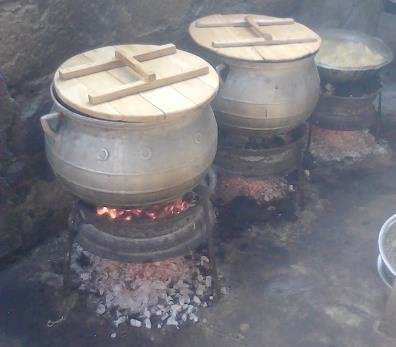Professor Marian Asantewah Nkansah of the Department of Chemistry at the Kwame Nkrumah University of Science and Technology (KNUST), Kumasi has stressed the urgent need for cleaner cooking methods in schools to protect the health of kitchen staff.
She made this call while presenting at the 2025 Annual Lecture of the Ghana Academy of Arts and Sciences, where she shared findings from a recent study conducted by KNUST researchers.
The research revealed that cooks working in school kitchens that use firewood and other traditional fuels are exposed to smoke levels far above what is considered safe for breathing.
According to Prof. Nkansah, women, who make up the majority of kitchen staff, face even higher risks of inhaling harmful particles that can affect their lungs and overall health.
The study also found that kitchens using traditional stoves recorded the highest pollution levels, while those using briquettes, improved stoves, and liquefied petroleum gas (LPG) showed much cleaner air.
Prof. Nkansah explained that the study clearly shows how switching to cleaner fuels and improved cooking stoves can significantly reduce air pollution and health risks.
She said the main challenge, however, is that many schools continue to rely on wood and charcoal because they are cheaper and easier to find.
The research, which monitored air quality in 14 public senior high school kitchens in Kumasi, was conducted by Mr. Boansi Adu Ababio, Prof. Marian Nkansah, Prof. Jonathan Nartey Hogarh, Dr. Thomas Peprah Agyekum, and Mr. Michael Kweku Commeh.
It found that smoke levels in some kitchens were up to ten times higher than what the World Health Organization (WHO) considers safe, putting kitchen staff at risk of respiratory and heart diseases.
Prof. Nkansah also pointed out that Ghana lacks a clear national policy to regulate air quality in large institutional kitchens such as those in high schools.
She called for greater collaboration between the Ghana Education Service, the Environmental Protection Agency, and the Occupational Health Directorate to ensure regular monitoring, training for kitchen staff, and the adoption of cleaner cooking technologies.
She added that promoting the use of gas, electricity, or solar-powered stoves, together with proper ventilation and routine maintenance of kitchen facilities, will go a long way in safeguarding the health of cooks and students who are often exposed to the smoke.
Prof. Nkansah concluded that improving air quality in school kitchens should be seen as a national priority, requiring joint efforts from policymakers, educators, and health authorities to create safer cooking environments for all.

















